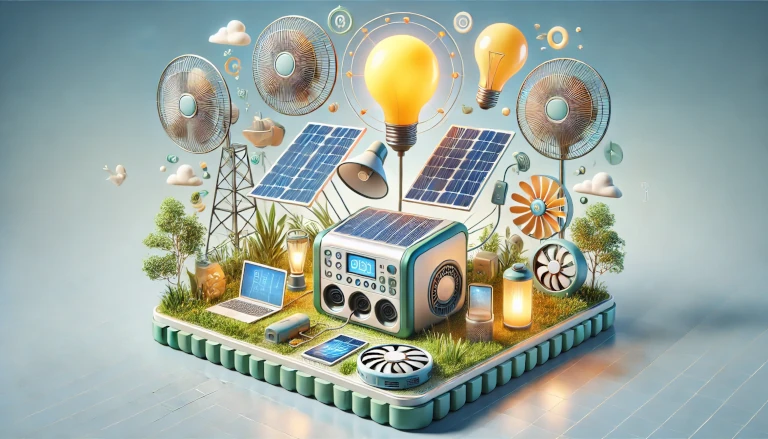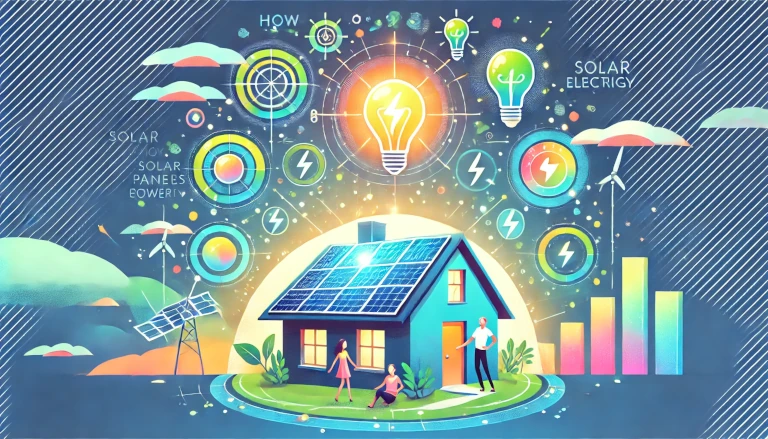A solar generator is an eco-friendly and efficient alternative to traditional gas-powered generators, converting sunlight into electricity. But why should you consider investing in a solar generator? How does it work? Where can you use it? This guide explores everything you need to know about solar generators, their advantages, disadvantages, costs, and how they could benefit you.
What is a Solar Generator? 🤔
A solar generator is a portable system designed to capture, store, and convert solar energy into electrical power. It typically consists of solar panels, a battery storage system, and an inverter. The solar panels capture sunlight, which is then converted into electrical energy and stored in the battery for later use. This stored energy can power various devices, from small electronics to appliances in your home or RV.
How Does a Solar Generator Work? 🌞🔋
The process is straightforward:
- Solar Panel Capture: Solar panels absorb sunlight and convert it into direct current (DC) electricity.
- Battery Storage: The generated DC electricity is stored in a battery within the solar generator.
- Inverter Conversion: The inverter converts the stored DC electricity into alternating current (AC), making it suitable for powering various household appliances and electronic devices.
This process enables a solar generator to provide reliable, renewable power without fuel or emissions.
Why Should You Consider a Solar Generator? 🌍
Solar generators offer numerous advantages, making them a popular choice for eco-conscious consumers and those seeking reliable backup power. Here are a few reasons why you might consider one:
- Eco-Friendly Power Source: Solar generators produce clean energy without emissions, reducing your carbon footprint.
- Quiet Operation: Unlike traditional gas generators, solar generators operate silently, making them perfect for use in quiet environments like campsites or residential areas.
- Cost Savings Over Time: While the initial cost can be higher than gas generators, solar generators often save money over time since they don’t require fuel.
- Portability: Many models are lightweight and easy to transport, making them ideal for camping, tailgating, or RVing.
When and Where to Use a Solar Generator? ⛺🏕️
Solar generators are versatile and can be used in various settings:
- Camping and Outdoor Activities: Perfect for powering small devices, lights, and even mini-fridges without disturbing the peace of nature.
- Emergency Backup Power: In case of power outages, a solar generator can provide essential backup power to keep your devices and appliances running.
- RV and Tiny Homes: Solar generators can power your off-grid lifestyle, ensuring you have access to electricity wherever you go.
What Are the Advantages and Disadvantages? 📊
Advantages:
- Renewable Energy Source: As long as there is sunlight, you have access to free power.
- Minimal Maintenance: With no moving parts, solar generators require minimal maintenance.
- Safe for Indoor Use: No harmful fumes make it safe to use indoors.
Disadvantages:
- Dependent on Sunlight: Solar generators rely on sunlight, so they may not be as effective on cloudy days or during nighttime.
- Higher Initial Cost: Although they save money over time, the upfront cost is often higher than gas generators.
- Limited Power Supply: Suitable for small to medium power needs but may not be ideal for heavy-duty equipment.
How Much Does a Solar Generator Cost? 💸
Solar generator prices vary depending on capacity, brand, and features. Small portable models start around $200-$300, while larger, more powerful units can cost $2,000 or more. The cost is justified by their long-term savings, as they do not require fuel and have low maintenance costs.
For instance, a model like the Goal Zero Yeti 400 (about $600) might suit small appliances, while a Bluetti AC200P (around $1,800) offers a higher capacity for larger needs.
What Are the Cost Benefits? 🏷️
Although solar generators have a higher initial cost, they offer significant long-term savings:
- No Fuel Costs: Since they use sunlight, you don’t need to spend money on fuel.
- Lower Maintenance Costs: With fewer parts that can wear out, you’ll likely spend less on repairs.
- Tax Incentives: In some regions, purchasing solar products can qualify for tax credits, further reducing overall costs.
How to Choose the Best Solar Generator? 📋
When choosing a solar generator, consider the following factors:
- Power Needs: Determine how much power you need for your devices. Look for a generator that meets or exceeds this requirement.
- Battery Capacity: A larger battery capacity means you can store more energy, which is useful for longer periods off-grid.
- Portability: Consider the weight and size if you plan on moving it frequently.
- Recharge Speed: Some models charge faster than others, which can be critical if you rely on it daily.
Final Thoughts 💭
Solar generators are an excellent option for anyone looking to harness renewable energy for various applications, from camping trips to emergency backup power. While they may not replace traditional generators for heavy-duty applications, they are perfect for smaller, everyday power needs. With the ability to save on fuel costs and reduce your carbon footprint, a solar generator is a worthwhile investment.
Discover more from Green Ecosystem - Renewable Energy, Agriculture, and Environmental Sustainability
Subscribe to get the latest posts sent to your email.


